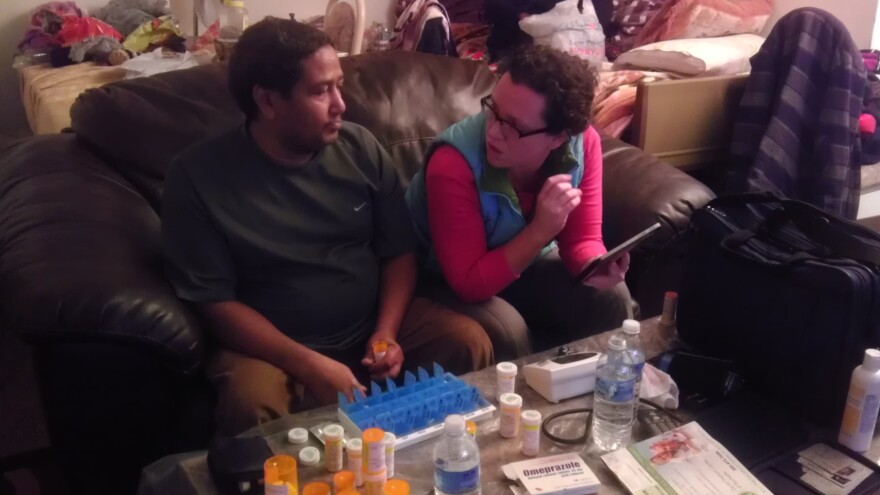The Innovation Trail is looking at how refugees have weaved their way into upstate New York's changing economy. You can find more from this series here.
This fall day, community health nurse Sarah Miner is welcomed warmly into the home of Somali refugee Abdallah. Miner works with HCR Home Care in Rochester and she’s been visiting Abdallah and his family for a while now.
On a normal visit she’d be accompanied by a member of the Somali community to act as translator and cultural liaison, but today she's flying solo. She’s reached a point where she can visit on her own, but that’s only because the family knows her.
“With these communities that there are language issues, there are cultural issues, there are a lot of things they don’t understand," Miner said. "And of course with a lack of understanding a lot of times comes fear. So to just open the door to someone you don’t know, that’s probably not going to happen.”
Abdallah, and many others like him, need someone like Miner to help navigate prescriptions and keep them on track with regimes like a diet that helps manage diabetes.
In Rochester, an aging refugee population presents both a challenge and an opportunity for the city’s health care workers. There’s a disconnect between those in need and the services that are available, but there are attempts to train people from the refugee communities to close that gap.
With an aging population there’s a growing need for home health care like this in the refugee community, but Miner said language and cultural barriers make it harder to deliver.
“Many of these services already exist so we don’t have to reinvent the wheel, these are services that we’re already doing," said Miner, "but then it becomes really frustrating because you’re saying well then, why aren’t we connecting?”
Link in the chain
The company Miner works for is responding. They’re now training people from refugee communities as home health aides.
“Access to any resource is almost based on this chain of knowledge and chain of communication," she said. "So you know somebody who knows somebody who knows somebody. And so with this, we’re trying to be in part of that chain. We want to be a link in that chain."
Jagar is a Bhutanese refugee who came to the U.S. from Nepal last October. He’s one of the first graduates of HCR’s home health aide program.
Jagar used to do seasonal work, but health care provides the chance for a more stable future, he said.
“When they can sell their products more, they hire more guys. When it stops, they fire the guys. So it’s not like that here. We can have at least part time. It’s better here than seasonal job.”
Jagar says elder care in the refugee community often falls to family members. The problem is those family members aren’t trained.
“What I want to do is I want to share this knowledge, what I know, what I have learned from here to them.”
“If other aides go to the house, then culture differs, the language differs, they don’t understand them,” he says.
Sadiya Omar is one of the leaders of the Somali Community in Western New York, a local refugee resource center.
It’s crucial, she said, that home health care professionals understand the culture and the language of their patients.
“It has to be somebody they trust. Trust matters a lot in our community," she said. "So you can’t just go and knock the door and then they’ll open the door for you. They have to know who you are, they have to get to know you, who you are,”
And there are other obstacles. Transport can be an issue too, said Omar, especially for women.
"Across the board in health care resources, we need the personnel in health care to represent the populations that its serving."
“Where we came from we didn’t have the privilege as women to drive," she said, "but coming here, it’s like you have to drive, you have to. It’s not like you have to depend on somebody else.”
Miner, the nurse, said it’s important to encourage more refugees to get into health care.
“Across the board in health care resources, we need the personnel in health care to represent the populations that it’s serving,” she said.
And something is starting to happen in upstate cities. Younger refugees who came here as children are starting to graduate from high school and college, and often choosing to stay put.
But, right now, most refugees with the right skill sets are already employed in other lines of work.
That makes it almost impossible, Miner said, to get them into an unpaid three-week home health aide training program.
“Because these people tend to be kind of the ones their families rely on," she said. "So it’s not even just income for them, it’s income for their whole family. So that’s the biggest challenge.”
It’ll take a lot more people like Jagar to complete the training and spread the word before new arrivals will see health care as a viable career path.






